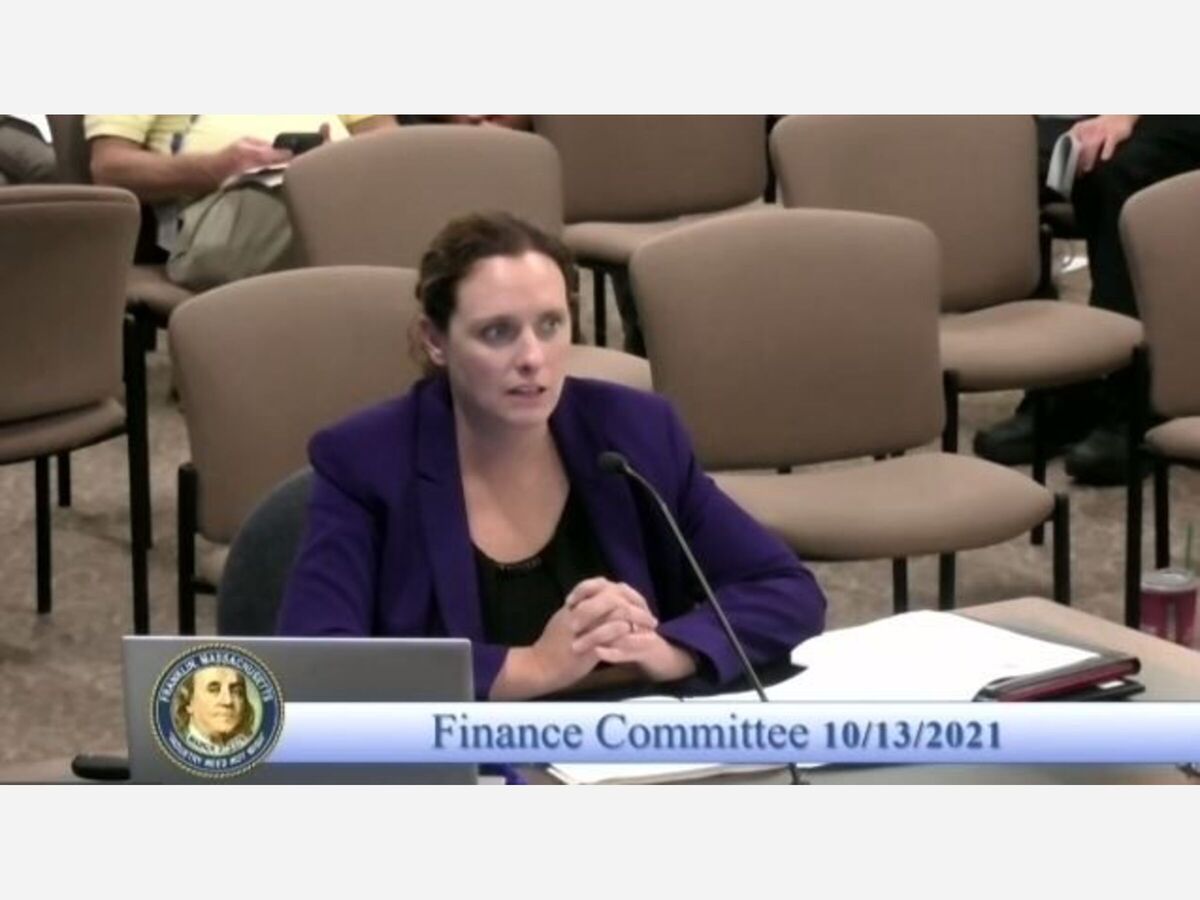Image

Above, Town HR Director Karen Bratt reporting to the FinCom Wednesday evening.
Those who thought the Finance Committee might let slip a hint regarding persistent whisperings about a need for an override just before the town’s Nov. 2 biennial election, were probably disappointed. There were facts and figures aplenty but little explicit or worrisome.
The meeting started off with an election of officers which returned all familiar faces.
Since there were no public comments, the FinCom then approved the agenda for the prior meeting and then tackled to matters, the Senior and Veterans Tax Work off Programs: a. Resolution 21-59: Further Amending the Senior Citizen Property Tax Work-Off Abatement Program b. Resolution 21-60: Further Amending The Veterans’ Property Tax Work-Off Abatement Program
Town Administrator Jamie Hellen called the matter a work in progress. He said staff had been planning to have work more advanced for the next meeting but wanted everyone to see where things stood. “We are going to suggest to the Council to increase the Veterans and Disabled exemptions f rom $400 to $800 and from $1000 to $2000 respectively,” he said.
The rate of pay for tax work off by seniors is also going to rise to match the state minimum wage. “People are often surprised to find that government is not required to pay minimum wage,” Hellen said.
Karen Bratt, Franklin’s HR director, delivered a lengthy presentation on the Human Resources Department & Employee Benefits.
She noted the town is experiencing a generational change, with many employees retiring or preparing to do so. In fact, she noted, about one-third of town employees are new since 2017. She also noted that her department is co-lead on negotiations with seven unions.
She is also tasked with reviewing healthcare plans, managing worker’s comp program, and maintaining current job descriptions and compensation plans. She is assisted by two full-time staff members and works with two staff member from the school department
She noted that the benefit budget has risen significantly recently due to Norfolk County Pension Assessment, Employee and Retiree Health Insurance, and annual deposits for OPEB (other post-employment benefits).
Bratt pointed out that as of June, the Norfolk County Retirement System is only 63.5 percent funded and the town’s FY22 assessment is some $6.7 million. On a positive note, she said the system is on-track to be fully funded by 2030.
On the health insurance front, she said the town continues to see significant cost increases but the increased share paid by employees and the number of employees willing to join high-deductible plans has helped to keep things from getting even worse. The FY22 increase is expected to be 8.95 percent.
Regarding OPEB, as of June, the Town had an accrued liability of about $73 million. As with the County pensions, the Town is prioritizing OPEB by spending $700,000 annually, and increasing that amount by $50,000 each year. In addition, she noted, 10 percent of the Town’s free cash is also allotted annually.
The Town handles Workers Comp by simply paying directly rather than engaging in an insurance program.
Chair William Dowd asked about overall compensation levels. “Is there a target range for increases,” he asked?
Hellen said there is some variation, for example among unions, but stressed that the town tries to be fair across the board with COLA (cost of living adjustments). And, he noted, in the early 2000s, there was considerable acrimony when the schools negotiated a higher increase, which ended up coming out of compensation budgets of other departments.
Dowd also asked about health insurance groups involving multiple towns. But Helen said their successes had been mixed: sometimes achieving great savings for a few years only to see costs skyrocketing later.
The committee than moved on to a discussion of American Rescue Plan Act (ARPA). Hellen told the committed that a March 2020 Federal allocation of $2.92 million was nearly gone.
FEMA is expected to provide nearly $600,000 eventually but Hellen noted that the process can sometimes take years.
He credited all the Federal monies for helping the town weather the pandemic with little impact on operations.
Another $10.2 million is in the pipeline through the American Rescue Plan Act, but some of it is allocated through Norfolk County, which takes a portion of the funds, he noted. This tranche has an expiration data of Dec. 2024.
He also not that the funding is restricted to public health, economic impact, revenue replacement, employee premium pay, water and sewer infrastructure, and broadband.
Hellen warned that considerable regulation surrounded the spending and, because so much money is being thrown at the same categories, costs are likely to rise sharply since there are a limited number of contractors who can perform the work. On the plus side, Hellen said some of the money can be applied to the town’s huge Stormwater Infrastructure obligation under the EPA mandate, though the funds are only a small portion of total required spending.
Another infrastructure spending item is expected to be addressing the “Populatic Bowl” – a nickname for the northeast corner of town where cell service is spotty and police and fire communication is poor.
Committee member Natalie Riley asked where these funds are accounted for in the budget and Hellen said they are in a Special Revenue account, outside of normal operational and capital budgets.